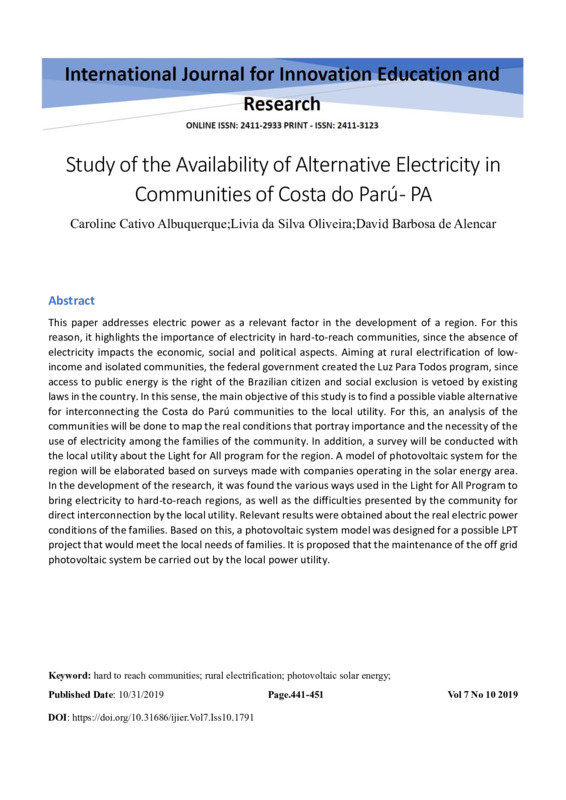Study of the Availability of Alternative Electricity in Communities of Costa do Parú - PA
Item
-
Tipo do ITEM
-
Artigo Ciêntifico
-
Título do Artigo
-
Study of the Availability of Alternative Electricity in Communities of Costa do Parú - PA
-
Descrição
-
Abstract
This paper addresses electric power as a relevant factor in the development of a region. For this
reason, it highlights the importance of electricity in hard-to-reach communities, since the absence of
electricity impacts the economic, social and political aspects. Aiming at rural electrification of lowincome and isolated communities, the federal government created the Luz Para Todos program, since
access to public energy is the right of the Brazilian citizen and social exclusion is vetoed by existing
laws in the country. In this sense, the main objective of this study is to find a possible viable alternative
for interconnecting the Costa do Parú communities to the local utility. For this, an analysis of the
communities will be done to map the real conditions that portray importance and the necessity of the
use of electricity among the families of the community. In addition, a survey will be conducted with
the local utility about the Light for All program for the region. A model of photovoltaic system for the
region will be elaborated based on surveys made with companies operating in the solar energy area.
In the development of the research, it was found the various ways used in the Light for All Program to
bring electricity to hard-to-reach regions, as well as the difficulties presented by the community for
direct interconnection by the local utility. Relevant results were obtained about the real electric power
conditions of the families. Based on this, a photovoltaic system model was designed for a possible LPT
project that would meet the local needs of families. It is proposed that the maintenance of the off grid
photovoltaic system be carried out by the local power utility.
Keyword: hard to reach communities; rural electrification; photovoltaic solar energy;
-
Abstract
-
Abstract
This paper addresses electric power as a relevant factor in the development of a region. For this
reason, it highlights the importance of electricity in hard-to-reach communities, since the absence of
electricity impacts the economic, social and political aspects. Aiming at rural electrification of lowincome and isolated communities, the federal government created the Luz Para Todos program, since
access to public energy is the right of the Brazilian citizen and social exclusion is vetoed by existing
laws in the country. In this sense, the main objective of this study is to find a possible viable alternative
for interconnecting the Costa do Parú communities to the local utility. For this, an analysis of the
communities will be done to map the real conditions that portray importance and the necessity of the
use of electricity among the families of the community. In addition, a survey will be conducted with
the local utility about the Light for All program for the region. A model of photovoltaic system for the
region will be elaborated based on surveys made with companies operating in the solar energy area.
In the development of the research, it was found the various ways used in the Light for All Program to
bring electricity to hard-to-reach regions, as well as the difficulties presented by the community for
direct interconnection by the local utility. Relevant results were obtained about the real electric power
conditions of the families. Based on this, a photovoltaic system model was designed for a possible LPT
project that would meet the local needs of families. It is proposed that the maintenance of the off grid
photovoltaic system be carried out by the local power utility.
Keyword: hard to reach communities; rural electrification; photovoltaic solar energy;
-
Língua do arquivo
-
inglês
-
Data da Publicação
-
Ano 2019
-
Palavra-chave
-
hard to reach communities
-
rural electrification
-
photovoltaic solar energy
-
Autores
-
Caroline Cativo Albuquerque
-
Livia da Silva Oliveira
-
David Barbosa de Alencar
-
Local
-
ITEGAM - Manaus, 2019


